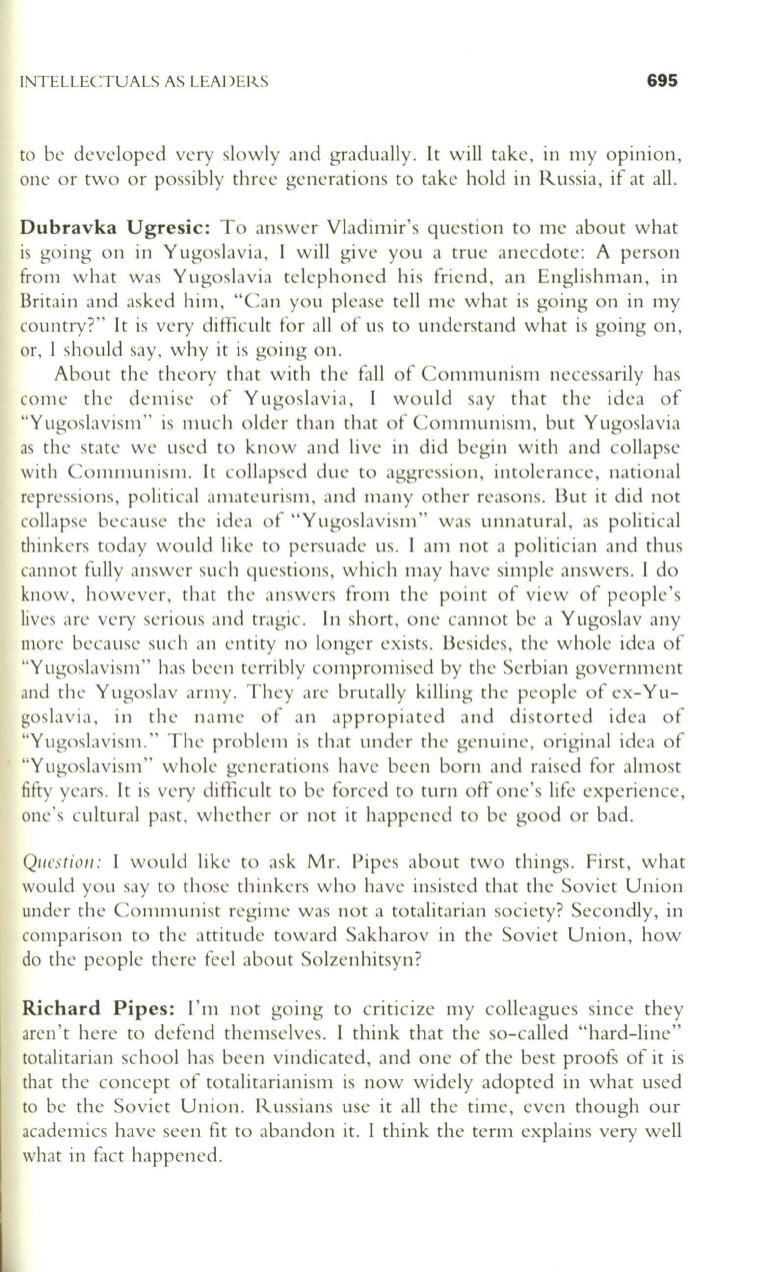
INTELLECTUALS AS LEADEIl..S
695
to
be developed very slowly and gradually . It will take, in my opinion,
one or two or possibly three generations to take hold in Russia, if at all.
Dubravka Ugresic:
To answer Vladimir's question to me about what
is going on in Yugoslavia, I will give you a true anecdote: A person
from what was Yugoslavia telephoned his friend, an Englishman, in
Britain and asked him, "Can you please tell me what is going on in my
country?" It is very diffi cult for all of us to understand what is going on,
or, I should say, why it is going on .
About the theory that with the fall of Communism necessarily has
come the demise of Yugoslavia, I would say that the idea of
"Yugoslavism" is much older than that of Communism, but Yugoslavia
as the state we used to know and li ve in did begin with and collapse
with Communism. It collapsed due to aggression, intolerance, national
repressions , politi cal amateurism, and many other reasons. But it did not
collapse because the idea of "Yugoslavism" was unnatural, as political
thinkers today would like to persuade us. I am not a politician and thus
cannot fully answer such questions, which may have simple answers. I do
know, however, that the answers from the point of view of people's
lives are very serious and tragic. In short, one cannot be a Yugoslav any
more because such an entity no longer exists. Besides, the whole idea of
"Yugoslavism" has been terribly compromised by the Serbian government
and the Yugoslav army . They are brutally killing the people of ex-Yu–
goslavia, in the name of an appropiated and distorted idea of
"Yugoslavism. " The problem is that under the genuine, original idea of
"Yugoslavism" whole generations have been born and raised for almost
fifty years. It is very difficult to be forced to turn off one's life experience,
one's cultural past, whether or not it happened to be good or bad.
Ques tioll:
I would like to ask Mr. Pipes about two things. First, what
would you say to those thinkers who have insisted that the Soviet Union
under the Communist regime was not a totalitarian society? Secondly, in
comparison to the attitude toward Sakharov in the Soviet Union, how
do the people there feel about Solzenhitsyn?
Richard Pipes:
I'm not going to criticize my colleagues since they
aren't here to defend themselves. I think that the so-called " hard-line"
totalitarian school has been vindicated, and one of the best proofs of it is
that the concept of totalitarianism is now widely adopted in what used
to be the Soviet Union. Russians use it all the time, even though our
academics have seen fit to abandon it. I think the term expla ins very well
what in fact happened.


